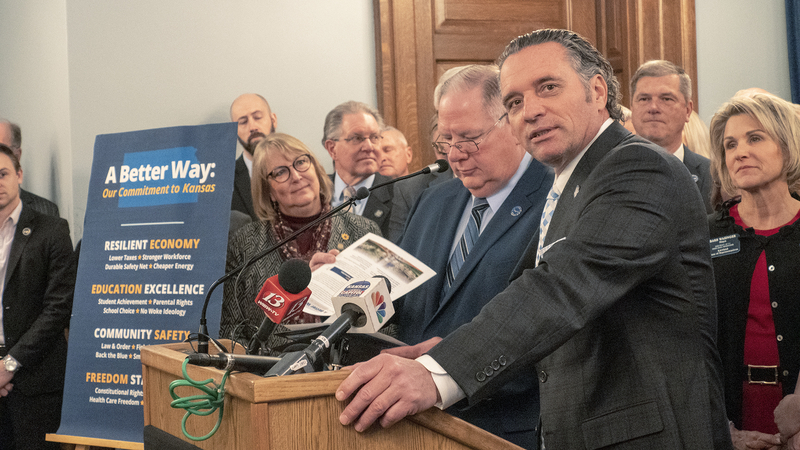New bill would ban gender-affirming medication and surgery for Kansans under the age of 21

TOPEKA — Transgender youths will once again be at the forefront of debate in the Kansas Legislature, with lawmakers pushing a bill that would criminalize gender reassignment surgery and hormone therapy, allowing few exceptions.
Conservative Republicans both nationally and locally have used laws targeting transgender youths as a rallying cry, with Kansas Attorney General Derek Schmidt emphasizing his support of a trans student athlete ban in his recent gubernatorial campaign. Kansas Republican leadership in the Legislature said they would work to create the fairness in women’s sports legislation, in a release of their legislative goals for the session.
Transgender legislation
Sens. Mike Thompson, R-Shawnee, and Mark Steffen, R-Hutchinson, are trying to criminalize hormone replacement therapy and gender reassignment surgery for transgender youths. Their bill, SB12, known as the Kansas child mutilation prevention act, would make it illegal for physicians to prescribe hormone replacement therapy or perform gender-reassignment surgeries for anyone under 21, with a few exceptions.
Exceptions would include cases in which a person was born with a medically verifiable disorder of sex development, such as not having enough hormone production, or being born with “irresolvable ambiguous” sex characteristics. The list of banned medication includes puberty-blocking medications, testosterone and estrogen.
Thompson said he wrote the legislation due to health concerns for Kansas youths, thinking they weren’t mature enough to make the decision to begin gender-affirming care until the age of 21. He referenced Chloe Cole, a woman who got a mastectomy as a teenager when she believed herself to be a trans man. She has since become an anti-transgender advocate. Thompson claims Kansas youths are being influenced into making transitioning decisions they’ll later regret.
“The puberty blockers, a lot of times you’ll see an increase in suicides about seven years after they start taking these things, so it’s a delayed reaction. So there are mental health issues with these types of procedures,” Thompson said.
Health institutes such as the American Medical Association, the American Academy of Child and Adolescent Psychiatry and the American Academy of Pediatrics, have opposed legislation such as SB12, saying banning gender-affirming care for transgender minors was damaging and not rooted in science.

Senate President Ty Masterson said he supports the ban. When the Kansas Reflector asked if he felt there was an issue with lawmakers controlling the health care of minors when so many GOP legislators point to supremacy of parental control of education and health decisions of their children, he said he didn’t see a discrepancy in the legislation.
“I don’t think it’s incongruent with the philosophy with parents because you’re talking about permanent surgery,” Masterson said while answering news media questions Monday.
The American Civil Liberties Union of Kansas has spoken out against the legislation, saying the bill takes away individual choices for Kansans.
“This is an extremely harmful and antagonistic bill that would ban medically necessary, safe, and evidence-based medical care, and lead to negative mental and physical health outcomes for both cisgender and transgender Kansans,” said ACLU legal fellow D.C. Hiegert in an emailed statement to Kansas Reflector. “The bill uses intentionally incendiary, false, and offensive terminology — all premised on medical falsehoods — in order to inflict great harm.”
Arkansas and Alabama have passed similar legislation to ban gender-affirming medical care for transgender minors, but the ACLU has successfully sued to stop the laws from coming into effect, Hiegert said.
While legislation targeting transgender youths has been much discussed, Kansas lawmakers have introduced a slew of other bills this year, including abortion regulations and limits on driving while tired. The bills filed in the House and Senate during the first week of the legislative session have some overlap in terms of loosened COVID-19 vaccine exemptions. Masterson said the GOP’s legislative focus would be on protecting Kansas youths from a “sexualized woke agenda,” and increasing parental rights not to vaccinate their children.
“It’s your future. And that’s our commitment to students and not legacy systems,” Masterson said during a Tuesday release of the legislative agenda.
Senate legislation
SB5, sponsored by Republican Sen. Mark Steffen, would prohibit the prescription of abortion drugs by telemedicine, as well as take away the governor’s ability to alter such prohibitions during states of emergency.
SB6, also from Steffen, would limit the authority of health officers and the secretary of health and environment to prevent the spread of infectious or contagious disease, taking away the secretary’s authority to quarantine people and impose penalties for infected people.
SB10, from retiring Sen. Tom Hawk, would increase the in-session salary of the Legislature, starting in 2025. The bill would implement a raise after the 2024 elections, increasing wages in an attempt to better compensate legislators. Hawk said he hoped to create a financial framework in which lawmakers were able to earn about $50,000 annually.
SB20, introduced by Steffen and Thompson, would require vaccine requirement exemptions in places such as child care facilities, elementary schools, high schools and postsecondary educational institutions without asking why the exemption request was asked for. The legislation would also eliminate the requirement to have a meningitis vaccine requirement in order to live in student housing, according to the bill summary.
House bills
HB2001, from Rep. Brett Fairchild, would define impeachment grounds for Supreme Court Justices and certain district court judges. The grounds include exhibiting wanton or reckless judicial conduct, personal misbehavior and the failure to properly supervise judicial personnel.
HB 2004, introduced by Reps. Bill Rhiley, Randy Garber, Joe Seiwert and Paul Waggoner, would tax electric vehicles, creating a road repair tax for electricity distributed from charging stations for electric vehicles.
HB 2005, introduced by Rep. John Carmichael, would make driving while extremely tired a traffic infraction, saying no person should operate a car when they are fatigued to the point where their driving is affected.
HB 2007, a group effort by Reps. Brett Fairchild, Carrie Barth, Don Hill, Michael Murphy, Pat Proctor and Bill Rhiley, would prohibit the secretary of state and health from requiring children to receive the COVID-19 vaccination to attend child care facilities, or schools.
HB 2009, from Rep. Stephanie Clayton-Sawyer, would give a sales tax exemption for feminine hygiene products and diapers.








